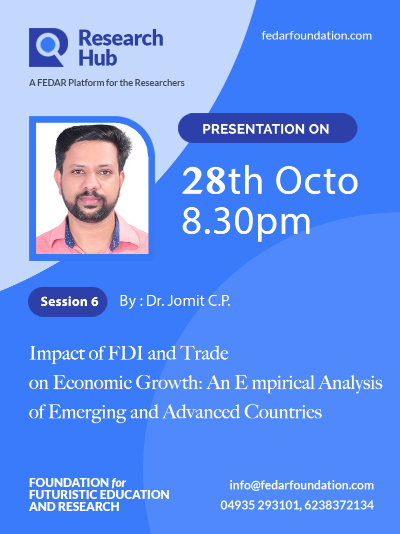Impact of FDI And Trade on Economic Growth

Thesis paper by : Dr. Jomit C.P.
Presented on : 28-10-2021
Summary
Impact of Foreign Direct Investment and Trade on Economic Growth: An Empirical Analysis of Emerging and Advanced Countries
High economic growth is a prime concern of all nations across the world. International trade and Foreign Direct Investment (FDI) have been found to be instrumental in influencing economic growth in developing as well as developed countries (Frankel and Romer, 1999; Belloumi, 2014). FDI is considered as the predominant source of external financing for developing countries (Calderon et al., 2002; Aitken and Harrison, 1999). However, the developed countries remained as the prime destination of FDI, accounting for more than three-quarters of global inflows until the 1970s (UNCTAD, 2001). With the growing trade and the size of the economy, the global inward FDI (IFDI) and outward FDI (OFDI) experienced a tremendous shift in the power center from the developed countries to emerging countries during the last decade. The global share of GDP and the share of IFDI and OFDI have steadily decreased in the advanced countries, while they recorded a consistent increase for the emerging countries. Therefore, the importance of research shifted towards the IFDI and OFDI of developing countries.
Although the previous studies bring out various aspects of the relationships between FDI and economic growth, the literature review reveals an absence of any comprehensive attempt in dealing with the impact of trade and FDI on the economic growth in the emerging and advanced countries. The role of foreign investment and trade in the economic growth in developing countries remains as one of the controversial subjects of research due to their positive and negative aspects of economic growth (Kumari, 2014). Moreover, empirical studies analysing the relationship among IFDI, OFDI, trade and economic growth for groups of countries with the same growth characteristics are scarce. Since the question of whether IFDI, OFDI and trade trigger economic growth or the economic growth brings IFDI, OFDI and trade is an unresolved issue, this issue has been the subject for intense analysis, both in theoretical and empirical researches.
This study aimed to evaluate the impact of IFDI, OFDI and trade on economic growth in emerging and advanced countries for the period 1992-2017. For this purpose, this study analysed the trends and causal relationship of GDP, IFDI, OFDI and trade using time series data. The determinants of IFDI and OFDI and their impact on economic growth were studied using the panel data. A random effect model was used for the analysis of determinants, and fixed effect model was used to evaluate the impact on economic growth based on the Hausman specification test. The trend analysis revealed that emerging countries have higher growth trends compared to advanced countries. The causality analysis revealed that majority of the emerging and advanced countries experienced unidirectional causality from economic growth and trade towards IFDI and OFDI, and the bidirectional causality between economic growth and IFDI, economic growth and OFDI, and trade and IFDI.
The study revealed that there were a few common determinants for emerging and advanced countries in the host country determinants of IFDI and home country determinants of OFDI. However, the determinants of IFDI and OFDI of emerging countries were differentiated from the advanced countries. This study also found that macroeconomic factors still appeared to be the key variables in explaining IFDI and OFDI of emerging and advanced countries. However, the intensity of the factors varied considerably across these two groups of countries. The study observed that trade, openness and domestic investment were the major factors which stimulate economic growth both in the emerging and advanced countries rather than IFDI and OFDI. Besides, IFDI had no role in encouraging the economic growth of advanced countries. Thus, the empirical analysis supported the trade-led growth rather than FDI-led growth in both groups of countries. Therefore, this study concluded that trade and domestic investments are the favourable engines of growth in emerging and advanced countries. The feedbacks compiled through the present study would enable the policymakers to have comprehensive legislation and proceedings in strengthening the economic growth of emerging and advanced countries.






 Corehub Solutions Pvt. Ltd
Corehub Solutions Pvt. Ltd